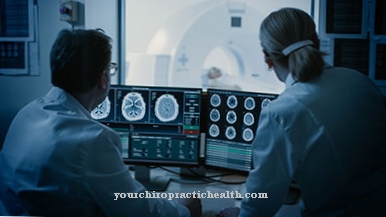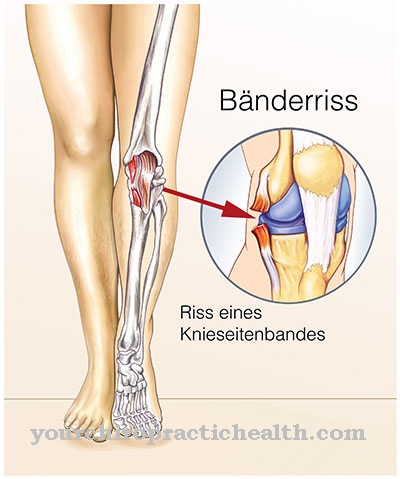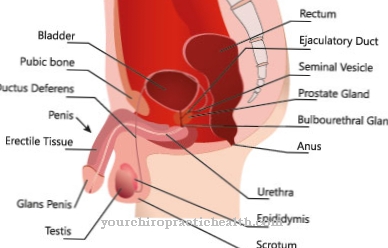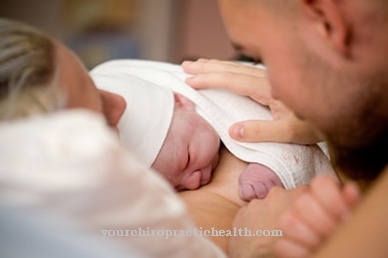Polyps as a form of tumors can in principle develop anywhere where there is mucous membrane, such as Colon polypsthat grow in the large intestine (colon). Even if they are benign cell clusters, they can be life-threatening as they carry the risk of degenerating into cancer cells.
What are colon polyps?

© pixdesign123 - stock.adobe.com
Colon polyps are relatively widespread, but many can be found especially in patients of advanced age: According to various studies, every third person over 60 has colon polyps.
Different types are differentiated. At around nine tenths, the so-called adenomas are the most common type. Their size can vary from a few millimeters to several centimeters, whereby it is assumed that the size correlates with the risk of degeneration: the larger the adenoma polyp, the more likely it is this can develop into a malignant tumor over the next few years.
If more than 50 colon polyps are found in the course of the examination, doctors speak of a case of polyposis: the pathological form of the unnaturally frequent occurrence of polyps in the colon.
causes
Similar to the related fibroids, the increased accumulation of cells on the skin, which are also popularly known as "wild meat", the cause of colon polyps is also unexplained.
Doctors assume a hereditary predestination, i.e. the hereditary susceptibility to the appearance of polyps. Diet is discussed as another possible cause. Against the background that colon polyps occur more frequently than average in Western civilizations than, for example, in Asia, some researchers assume that the reason for the occurrence of colon polyps is to be found in the different diets of people.
Others, however, see at least one favorable factor for the occurrence of polyps in the intestinal tract in the fact that the person concerned also suffers from chronic intestinal inflammation. Because sufferers of chronic bowel inflammation, such as ulcerative colitis, suffer from a constantly inflamed bowel, the body is stimulated to form "reserve cells" in the inflamed area of the colon, which ultimately leads to the formation of colon polyps.
Symptoms, ailments & signs
With colon polyps, patients often feel no symptoms. Symptoms can only occur when the polyps grow untreated. Above all, this includes:
- diarrhea
- constipation
- Blood in the stool
- Anemia (anemia), iron deficiency anemia
diagnosis
Because colon polyps usually do not cause pain and are otherwise largely harmless, at least as long as they are not degenerate, they are usually detected more by chance when the colon is examined for another reason.
Targeted polyps are only searched for in the context of colon cancer screening. From the age of 55, legally insured persons can have a colonoscopy performed every ten years at the expense of the health insurance company. The aim of this check-up is not only to be able to detect and treat possible colon cancer in its early stages, but also to significantly reduce the risk of cancer formation by removing degenerate colon polyps.
In the intestinal imaging, the only way to diagnose intestinal polyps, a flexible, tube-like probe is inserted into the patient's intestine, with a camera and surgical instruments installed on the head.If the gastroenterologist (specialist in intestinal diseases and gastrointestinal reflections) discovers colon polyps, he cuts them off in order to have their tissue examined in the laboratory.
If the sample is benign, the patient will have to go back to the colonoscopy in five years, where they will again look for colon polyps. If the colonoscopy is normal, the next examination will not be due again for ten years.
Complications
Colon polyps, if left untreated, can lead to some complications. Initially, there is a risk that the polyps will open and blood and pathogens will enter the gastrointestinal tract. This can lead to infections and, in the long term, anemia. Large polyps can constrict the intestinal walls and lead to constipation. Colon polyps rarely cause a life-threatening intestinal obstruction.
The main risk, however, lies in the development of malignant tumors. If the colon polyps are not removed, they can spread years later and lead to colon cancer. If the polyps spread to other organs, severe inflammation can develop, which can permanently damage the internal organs and the entire gastrointestinal tract. In addition, chronic gastrointestinal complaints can occur.
If the polyps are not removed by then at the latest, this can have a negative effect on general well-being and subsequently cause serious physical and mental complications. The surgical removal of colon polyps harbors the typical dangers. This can lead to injuries to the intestinal walls during the procedure.
After the operation, scars can develop, which sometimes lead to functional disorders of the gastrointestinal tract. There is also a risk of allergic reactions and infections. If the colon polyps are detected and treated early, serious complications are unlikely.
When should you go to the doctor?
Since colon polyps usually do not cause any symptoms, a targeted examination is difficult. It is advisable to have a colonoscopy regularly from the age of 50 to detect any polyps at an early stage. The growths in the colon, while usually harmless, should be examined. In this way, degenerate colon polyps can be detected and the risk of cancer formation can be significantly reduced.
A specific examination is recommended if symptoms such as constipation or anemia occur more frequently. These symptoms indicate advanced polyps that may have already become infected or opened. Those affected who notice symptoms should speak to their doctor as soon as possible.
He can carry out an initial examination and then refer the patient to a specialist. If the intestinal polyps remain untreated, they can spread and, in extreme cases, cause colon cancer. There is also the risk that the growths will spread to other organs or the entire gastrointestinal tract and cause permanent damage. A doctor should be consulted at the latest when persistent gastrointestinal complaints are noticed.
Doctors & therapists in your area
Treatment & Therapy
Since colon polyps have no disease value in the strict sense, they do not require any treatment. The very fact that they can possibly develop into colon cancer precursors makes it necessary to remove benign colon polyps as part of a colonoscopy, which is the only way to remove such colon tumors.
Outlook & forecast
In most cases the colon polyps are symptom-free. Therefore, regular check-ups should be carried out to ensure a good prognosis. These ensure the possibility of early intervention.
If the polyps are detected by chance and removed, recovery occurs after just a few days. A check-up is then scheduled after about six months. If this is normal, further checks should be carried out every three years. Colon polyps become problematic when they remain undetected in the intestine for a long time. After a few years of existence, they mutate and develop a malignant course.
In about 90% of cases, colon cancer is based on the presence of polyps. In the worst case, if left untreated, the cancers in the intestine can lead to the patient's premature death. The size, number and location of the colon polyps are essential during development. The larger the individual polyps, the more likely it is that cancer will develop later.
After the colon polyps have been removed, there is a possibility of recurrence, especially in high-risk patients. The recurrence rate of the polyps in people who are overweight, old and high blood sugar levels is around 30-50%. Due to the high probability of recurrence of the polyps, regular check-ups are necessary for a good prognosis and for maintaining the patient's health.
prevention
Since the exact causes of colon polyps have not yet been clarified, no recommendations can be given for a specific prophylaxis.
The only way to counteract the formation of colon polyps and thus the risk of possible degeneration is the complete surgical removal of the colon. However, the possible side effects of a complete colon removal should not be ignored, which is why the so-called colectomy is only used in special extreme cases. A possible side effect of a colectomy is, for example, the loss of voluntary bowel movements, known as fecal incontinence.
Aftercare
When colon polyps have been removed from the bowel, consistent follow-up care is essential. This is closely related to the established fact that existing polyps can develop into cancer over time. It is therefore important to have a colonoscopy performed at regular intervals as part of the follow-up care.
The attending doctor decides at what interval this happens. This is usually a gastroenterologist or internist. The test for occult blood in the stool and various blood tests are also carried out as part of the follow-up care. How often depends on how severe the colon polyps were and whether there has been a history of colon cancer in the patient's family.
Follow-up care is particularly dependent on the cooperation of the patient. This includes a healthy lifestyle, especially when it comes to diet. A lot of fruit and vegetables as well as a diet rich in fiber are suitable for lowering the risk of cancer in the intestinal area. Polyps can also be positively influenced in their development.
Alcohol and nicotine also increase the risk and should therefore be avoided or significantly reduced. It is important to drink enough. In particular, still water and herbal teas are advisable in this context. A lot of exercise promotes bowel activity and thus the patient's intestinal health.
You can do that yourself
Colon polyps must always be treated medically. However, conventional medical treatment can be supported and accelerated by some self-help measures.
In general, dietary measures such as avoiding fast food, luxury foods and constipating foods are recommended. As a result, and through good overall intestinal hygiene, the development of further polyps can be avoided. The doctor will also recommend physical activity and adequate intimate hygiene.
A change in diet also helps against the typical complaints - diarrhea, constipation or anemia. Likewise, dietary supplements, natural pain relievers such as arnica and physiotherapy. Massages and alternative procedures such as acupuncture or yoga are also suitable for reducing pain and other complaints in a targeted manner.
Temporary or permanent fecal incontinence can occur even after successful treatment. For this reason, appropriate precautionary measures should be taken before the colectomy. In the case of chronic incontinence, it is sometimes useful to see a psychologist. The responsible doctor will answer which measures are useful in detail. The doctor can give further tips on aftercare after the surgical procedure and thus enable a quick and complication-free recovery.



























